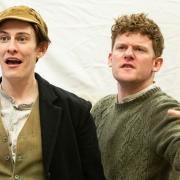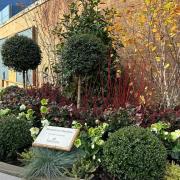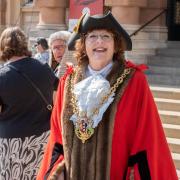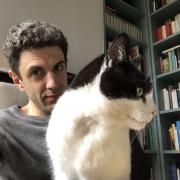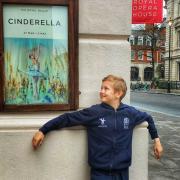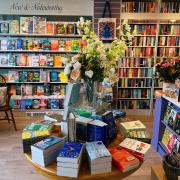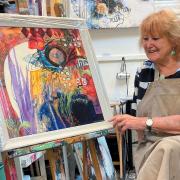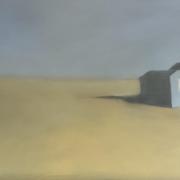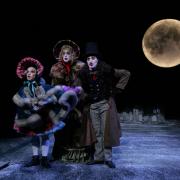Composer and musician William Drew-Batty has become something of a local legend. During Covid he used the power of music to lift people's spirits and provide hope by playing 71 concerts from the window of his Bungay home
As the world around him closed down, William Drew-Batty opened the window of his first-floor music room and began to play the piano, the note drifting along the street below. During the first of 71 consecutive evening performances it caught the attention of only his next-door neighbour, but by the end of the run – which had begun during the first Covid lockdown – dozens of people were gathering nightly to enjoy the music, all of them 'socially-distanced' but glad to be sharing the experience.
Even as Covid lingered in the towns and villages of Suffolk, William organised several programmes of lunch-time concerts in the spacious St Mary’s church in Bungay. He lives in the north Suffolk town with his wife, Victoria, and her two boys, Rollo and Ranulph. He also has two daughters from a previous marriage, Helena and Chloe. Born in Herefordshire, William and his father moved to Suffolk in the mid-70s when his parents split up, initially to Southwold.
“I had been offered a place at university – I was going to study English because I have always enjoyed poetry, the spoken word and literature generally – but then I decided it wasn’t what I wanted to do,” he says. “At that time I had never thought of a musical career. I drifted around a bit and then I began to work off-shore for a number of companies, on gas and oil drilling rigs.
“I had been a chorister and played the piano since I was about eight. Neither of my parents were particularly musical and my love of music may go back to stories of my great grandmother, who used to play by ear. If someone hummed a tune she could play it. During the war American airmen used to come past the window where the piano was and they’d ask her to play various tunes. She’s ask them to hum it and then she’d play it.”
%image(15710182, type="article-full", alt="Composer and musician William Drew Batty worked on oil rigs before deciding to pursue a music career.")
In between time on the rigs, William, who had been trained in classical music, played a lot of session work with various pop music groups and bands, some of them well-known, some local and some further afield. “I still didn’t know what to do with my life, but then a friend said why didn’t I study music.” He subsequently completed a degree course at the University of East Anglia before going on to Ruskin College, Cambridge to do a post-graduate degree. Since then his life has been in music, as a composer, musician, singer and teacher. He spent 15 years as a music teacher in schools but then, six years ago, established his own teaching business. “I’ve always had that tendency to want to change things suddenly rather than stick with the same thing,” he says.
Following the street concerts, which became known locally as 'Posh Busks', William arranged for a grand piano to be moved into St Mary’s church and the first of several programmes of music and singing went ahead. He felt strongly that lunch-time concerts would provide much-needed joy and respite to people enduring the Covid pandemic. And so they proved, continuing to be very popular. The concerts are free but people are asked to make donations to cover the expenses of performers travelling to the town.
As Covid took its grip on the country local people with musical instruments they had re-discovered in attics, lofts and cupboards came to William for help in developing their skills. There were also people who were interested in the way music worked and to discuss music, people who were interested in learning in a different way. “Victoria said to me why didn’t I play music out of the window. And one day I thought I’d give it a go.” About three weeks after first lockdown, the first of the 71 early evening performances began.
“I would open my window and start playing at 7pm and played for about half an hour or 20 minutes before I shut the window again. On the first night the lady who lived next door and who was watering plants was the only audience, but it then took off with people in little bubbles standing on the street, and people walking by who would listen for a few minutes and then move on.
“It was like that all the time and when it got to seven o-clock there would be people there waiting for me to start, some with glasses of wine in their hands. I received requests through Facebook and other means for particular pieces of music, including the Dad's Army, Coronation Street and EastEnders themes. Then we did bigger concerts including for the Victory in Europe Day and I remember going to the window and seeing people standing in little groups stretching down to the war memorial. People were very positive about it and got so people were sending it out live via Facetime to their friends in New South Wales, Porto Rico and all over the place.”
%image(15710183, type="article-full", alt=""When it got to seven o-clock there would be people there waiting for me to start," says composer and musician, William Drew Batty.")
Another idea developed from the Posh Busks was an invitation to people to reflect on their feelings about the Covid 19 situation, using a maximum of 19 words. Contributions flowed in and were put together in a piece called The Day We All Came Home, including film shots of empty streets and motorways, still available on You Tube. “It remains rather hard to watch and to think, did we really come through that? Some reflections were happy, some were sad and others were quite distressing.” William, who also runs choirs in the area, believes that out of the Posh Busks emerged a network of lasting friendships and community support among the people who were listening to the music. “It was how the people of a neighbourhood should look after each other – that’s how it became.”
Recently, William wrote and composed music for a tribute to the First World War composer and poet Ivor Gurney who suffered shellshock and whose life is commemorated in Westminster Abbey as one of the war’s 16 greatest poets. “I first came across him when I was at the UEA. I loved his songs so much and that period of music. When I looked into his life I found he had a humble background and, like me, he was a chorister and learned to play piano. He was prolific and I loved his poetry and wrote music which really linked with it.”
The result, last year was a touring show which featured Gurney’s songs and poetry. “He was actually a manic depressive. They didn’t know how to treat that in those days and he spent the last 15 years of his life in an asylum,” says William.
You can find William Drew-Batty, composer, musician and singing tuition on Facebook and Instagram




